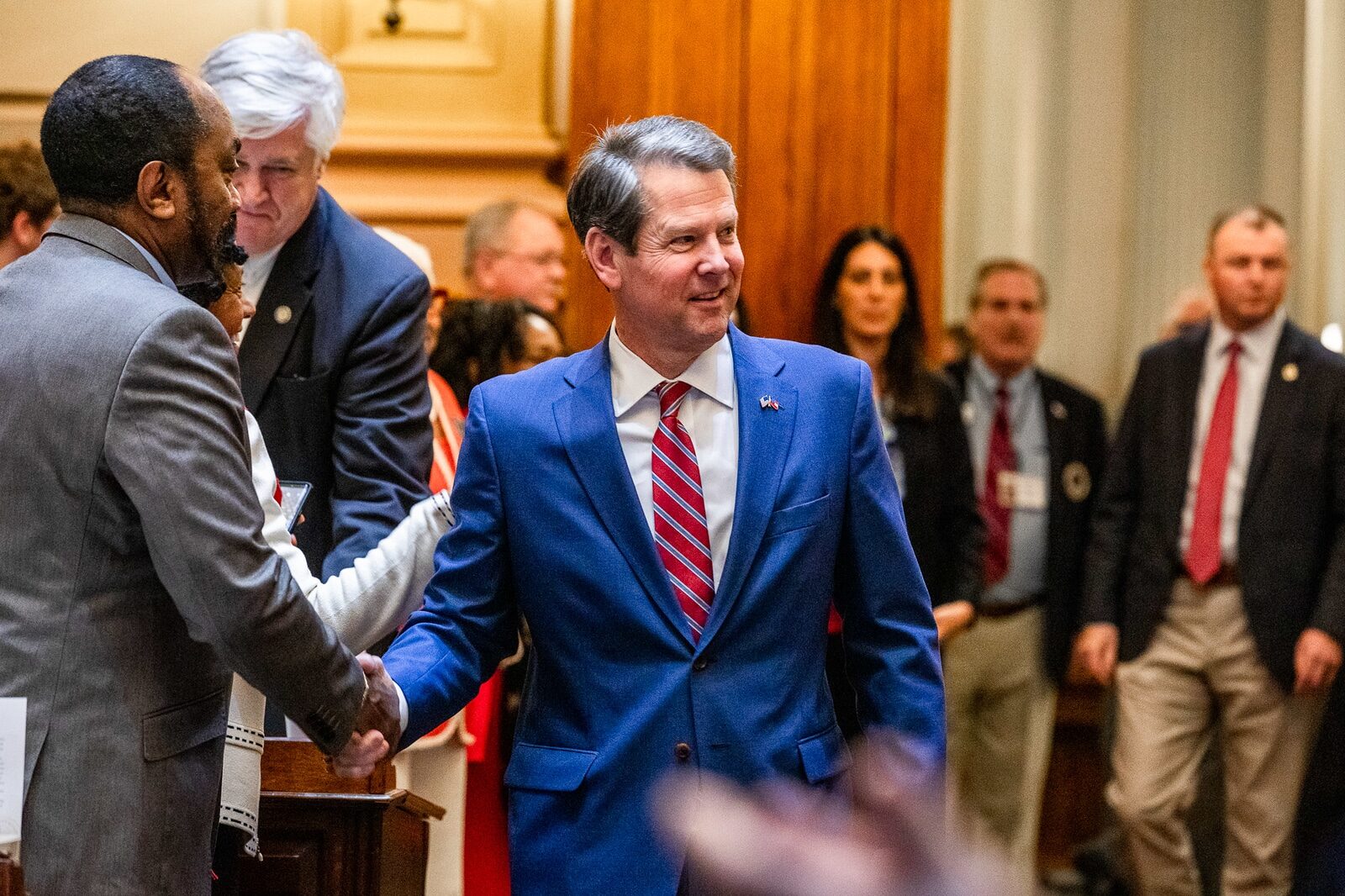Gov. Brian Kemp asked state lawmakers Thursday to give businesses more help dealing with the coronavirus pandemic, double down on investment in rural Georgia and build on last year’s criminal justice reforms.
In a 65-minute State of the State address to a joint session of the state House and Senate, Kemp proposed expanding a tax credit the General Assembly passed last year for Georgia businesses that make personal protective equipment (PPE) including masks and gowns to manufacturers of pharmaceuticals and medical equipment.
“We cannot waste time in bidding wars with other states or foreign adversaries,” the governor said. “No one nation should hold a monopoly on life-saving medicines and medical supplies, and we should bring these critical industries and the jobs that come with them back to America and here to Georgia.”
Along with restoring more than $1.2 billion to Georgia’s public schools to offset massive spending cuts on education the legislature imposed last year, Kemp called for a one-time $1,000 supplement to help Georgia teachers and other school employees reopen schools safely.
Building on the Rural Strike Team the governor formed in 2019 to lead efforts to create jobs in rural Georgia, Kemp recommended $40 million in the fiscal 2022 state budget to establish a Rural Innovation Fund to help rural businesses get started and grow.
“Many of the economic, medical, and other challenges that are facing rural Georgia cannot be fixed with a top-down, one-size-fits-all approach,” Kemp said. “These issues are best addressed through targeted, innovative, public-private solutions that meet the needs of specific communities not just today or tomorrow, but five, 10, or 25 years down the road.”
In the criminal justice arena, Kemp asked lawmakers to reform Georgia’s citizen’s arrest law as a follow-up to the hate-crimes bill the General Assembly passed last June. He cited the case of Ahmaud Arbery, a Black man shot to death while jogging on a Brunswick street last year by three white men.
“Ahmaud was the victim of a vigilante-style of violence that has no place in our state,” Kemp said. “We can again send a clear message: Georgia is a state that protects all of its people and fights injustice wherever it is found.”
Kemp spent much of Thursday’s address praising the heroism and self-sacrifice of health-care workers in hospitals and nursing homes across Georgia who stepped up to fight COVID-19.
The governor defended his “measured reopening” of the state’s economy to reduce the pandemic’s impact on businesses and their employees. He said he took a lot of criticism for that decision but heeded the pleas of business owners and essential workers struggling to make ends meet.
“These hardworking Georgians were struggling, not because their business was a failure or because their products or services were no longer needed. No, they faced devastation because of a virus, through no fault of their own,” Kemp said. “While some disagreed with me, I know our decision … to give these people a fighting chance – a glimmer of hope – meant everything to them.”
Democratic lawmakers were unimpressed with Kemp’s speech, noting he avoided talking about controversial proposals to change election laws that Republicans are pushing.
Minority-party leaders in both chambers pledged to press for expanding health insurance coverage, bolstering access to mail-in voting and passing a broader criminal justice reform package.
“Thousands of Georgians continue to live paycheck-to-paycheck, and financial security continues to be elusive for most Georgians,” said Georgia Senate Minority Leader Gloria Butler, D-Stone Mountain.
To offset last year’s budget cuts, Democrats called for a tax hike on tobacco and vaping products that would increase state revenues by $567 million to $705 million.
A criminal justice reform package Democrats rolled out Thursday goes beyond repealing the citizen’s arrest law to setting new standards for police training, limiting no-knock warrants and ending police choke holds.
Democrats said they also plan to introduce bills allowing Georgians to register to vote on Election Day and providing for state officials to send out absentee ballot request forms for each election, as happened ahead of last June’s primaries.
With those initiatives likely to meet a wall of opposition in the Republican-led General Assembly, Democrats are gearing up to frame election-law changes as attempts at voter suppression after President-elect Joe Biden became the first Democrat to carry Georgia since 1992 and Democrats flipped both of Georgia’s U.S. Senate seats last week.
“These barriers don’t prevent fraud,” state Sen. Elena Parent, D-Atlanta, said of election-law change proposals. “They prevent democracy.”
The rebuttal to Kemp’s speech from Democratic leaders also carried a warning following their defeat of Republicans in the presidential and Senate contests and ahead of Kemp’s potential rematch in 2022 against 2108 Democratic gubernatorial candidate Stacey Abrams.
“If you’re not working for all of Georgia, you won’t be working for Georgia much longer,” said Georgia House Minority Leader James Beverly, D-Macon.

Dave Williams | Capitol Beat News Service
Dave Williams is the Bureau Chief for Capitol Beat News Service. He is a veteran reporter who has reported on Georgia state government and politics since 1999. Before that, he covered Georgia’s congressional delegation in Washington, D.C.


